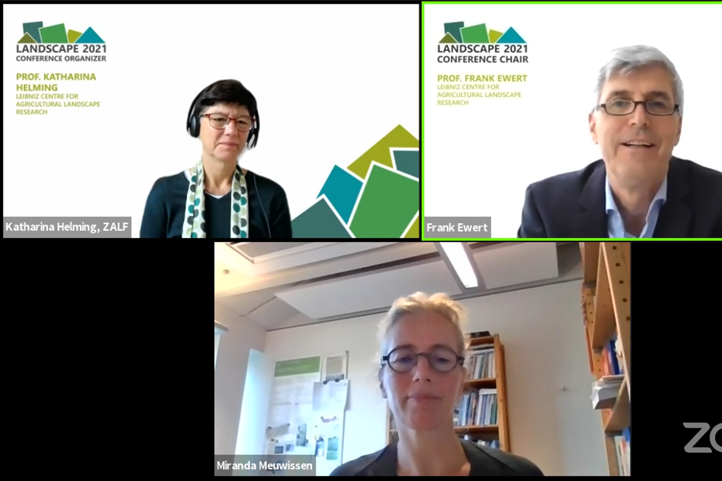20.09.2021
Press Release

Today, the international Landscape 2021 conference of the Leibniz Centre for Agricultural Landscape Research (ZALF) begins. The conference program focuses on the question of how a transformation of agriculture towards more climate resilience and sustainability can succeed. The conference is characterized by its holistic perspective on the topic: all aspects that are important for a sustainable transformation of agriculture will be considered by more than 400 participants from 43 countries.
Intensive agriculture, i.e. cultivation on large areas and specialization on a few crops, has led to enormous increases in yields. The negative environmental effects, such as the loss of biodiversity, damage to soils, bodies of water and ecosystems, as well as market-related economic uncertainty for farms, are no longer sustainable worldwide in view of the additional threat posed by climate change.
At the Landscape 2021 conference, participants are discussing approaches that focus on diversification, or increasing diversity, in agriculture. The researchers' vision is of resilient and sustainable agriculture, characterized by high productivity with low consumption of resources, while at the same time preserving ecosystems and biodiversity in the landscape system. Diversity should lead to positive interactions between agriculture and ecosystems as well as between agriculture and the food system. This should also enable new economic perspectives and technological innovations for farmers.
Diversity strengthens resilience
Research assumes that agriculture and nature benefit equally from increased diversity in the field, in the soil, in the landscape as well as in the value chain and finally on the plate. Diverse crop rotations and crop species in the field and varied landscape elements such as wildflower meadows, shrubs, trees and bodies of water in the surrounding agricultural landscape are expected to have a positive long-term impact on soil properties and yields.
Prof. Frank Ewert, Scientific Director of ZALF and Conference Chair, emphasizes: "Diversification is also important on an economic level. When farms grow different crops with different characteristics in a season, they spread their financial risk and do not necessarily have to fear for the loss of the entire harvest in the event of climate-related extreme weather events such as drought or heavy rain." Diversification is thus a fundamental building block for resilient agriculture on multiple levels.
Conference Chair Prof. Peter Feindt, Professor of Agricultural and Food Policy, Humboldt University Berlin, explains: "Resilience in agriculture means that agricultural systems can manage to survive crises and cope with necessary transformations as far as possible on their own. This requires individual farms and all the value chains to be future-oriented, to adopt integrated approaches, and to be highly capable of learning and adapting. Only then can food security and the protection of the underlying ecosystems be ensured."
Economic resilience and landscape diversity
The conference was opened by
Prof. Miranda Meuwissen, Professor of Risk Management in Food Supply Chains at Wageningen University in the Netherlands. In her keynote speech, she emphasized the importance of resilience in the agricultural system: "Fewer than half of European farms are economically viable in the long term. Liveable incomes also strengthen the resilience of agriculture and ecosystems. If there is sufficient income, farmers might have room to experiment with production practices which are possibly less harmful for the environment."
Douglas Landis, Professor of Entomology at Michigan State University (USA), will provide insight into his research with a keynote speech on the second day of the conference. Prior to the event, he stated: "Agricultural intensification has resulted in a loss of landscape structures such as forests, peatlands and grasslands in favor of large agricultural areas worldwide. The result is the loss of biodiversity and reductions in ecosystem services. This process of landscape simplification must be reversed – and this requires close cooperation between scientists and all key stakeholders."
Change is only possible together with practice
Because collaboration with practice is fundamental to a transformation toward sustainability and resilience in the agricultural system, stakeholders from agriculture and policy will be involved in Landscape 2021.
Conference Host Prof. Katharina Helming from ZALF emphasizes the special approach of the conference: "In order to focus on the entire landscape system around agricultural production, it is absolutely necessary to bring practitioners into the debate. Today, research projects with their application-oriented products for use in practice will present themselves at the Marketplace and search exchange. On the last day of the conference, we will invite farmers and representatives from science and politics to a round table discussion. This will also allow us to continue the dialog successfully launched at the federal level by the 'Commission on the Future of Agriculture'."
Virtual conference with varied formats
During the three days of the conference, participants at Landscape 2021 will choose from 175 presentations in 38 virtual sessions, which will be transmitted via video conferencing. Project groups and researchers will present a total of 85 scientific posters on an online conference platform. In addition, Masterclasses will be offered - this is an innovative format with a workshop character that focuses on mutual learning, a deeper introduction to the methodology and intensive discussions.
Project Partners:
- Leibniz Centre for Agricultural Landscape Research (ZALF), Müncheberg
- Humboldt University of Berlin
Funding notice:
Landscape 2021 is funded by Deutsche Forschungsgemeinschaft (DFG, German Research Foundation - project number 470007997).
 Press release as PDF file
Press release as PDF file
Further Information:
Pictures
For downloading the pictures please click on a picture and use the icon.


At Landscape 2021, more than 400 participants are currently discussing research approaches for sustainable and resilient agriculture. Prof. Frank Ewert and Prof. Katharina Helming from the Leibniz Centre for Agricultural Landscape Research (ZALF) e.V. and Prof. Miranda Meuwissen, Wageningen University opened the virtual conference. | Source: © ZALF.
